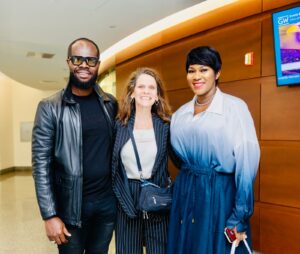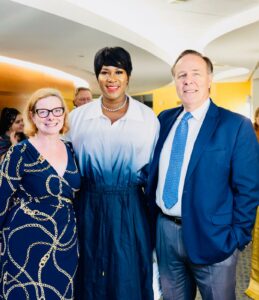In an inspiring collaboration, Nigerian actress and humanitarian Stephanie Okereke Linus has joined forces with the George Washington University’s Institute for Corporate Responsibility to launch the Maternal Health and Nutrition Initiative Africa (MaHNIA). This groundbreaking initiative aims to tackle pressing challenges in maternal health and nutrition across marginalised African communities, focusing on empowering women and improving long-term health outcomes.
The partnership was officially unveiled following two screenings of Stephanie’s award-winning film “Dry.” The movie, which poignantly explores the journey of a 13-year-old Nigerian child bride living with obstetric fistula, served as the backdrop for an impactful panel discussion. Hosted by GW’s Global Food Institute and Global Women’s Institute, the event delved into critical issues surrounding maternal health, women’s rights, and the importance of nutrition in building resilient healthcare systems in Africa.
Stephanie Linus, founder of the Extended Hands Foundation and a long-time advocate for women’s health, passionately shared her vision for MaHNIA. “Safe motherhood and proper nutrition are not privileges; they are fundamental rights,” she asserted. “Through this initiative, we aim to ensure that women in underserved communities not only survive childbirth but thrive afterward. MaHNIA is about combining healthcare and nutrition to deliver solutions that last.”
The significance of nutrition in maternal care was a key theme of the discussion. Tara Scully, Director of Curriculum Development at GW’s Global Food Institute, underscored this connection: “When we talk about healthcare, we must also talk about nutrition. A mother’s nutritional status impacts not just her health but her child’s as well. By integrating nutrition education into healthcare, we can improve outcomes for generations to come.”
Public-private partnerships emerged as a central strategy for tackling these issues. John J. Forrer, Director of GW’s Institute for Corporate Responsibility, highlighted their transformative potential: “The private sector, working alongside public health institutions, can significantly improve access to healthcare. By collaborating, we can ensure maternal health services reach the people who need them most.”
Other panellists brought further insights to the table. Erin Mielke, Senior Technical Adviser for Reproductive Health at USAID, called attention to the alarming rise in unsafe medical practices in low-resource settings, which are contributing to an increase in cases of obstetric fistula. “At USAID, we address these challenges through a comprehensive approach that includes gender-based violence training, nutrition assessments, and physiotherapy,” she explained.
Professor Lauri J. Romanzi from Thomas Jefferson University added urgency to the discussion by emphasising the preventable nature of fistula: “For every woman who survives a fistula, several others lose their lives. Strengthening healthcare systems is key to eliminating this tragedy entirely.”
The collaboration between GW University and Stephanie Linus aims to bridge gaps in knowledge and resources by developing a community-focused toolkit tailored to the realities of marginalised populations in Nigeria. The toolkit will be co-created with local partners, combining research and community engagement to ensure it meets actual needs and fosters meaningful change.
Linus closed the event by reflecting on her personal mission to use storytelling as a tool for social change. “My film Dry tells the story of one girl, but her experience mirrors those of millions of women who endure similar struggles in silence. Through MaHNIA, we are not only giving them a voice but also providing real, actionable solutions.”
The Maternal Health and Nutrition Initiative Africa represents a significant step forward in addressing the maternal health crisis across the continent. By combining healthcare services, nutrition support, and community-driven approaches, the initiative seeks to create a brighter and healthier future for women and children in underserved communities.
See photos from the event below:






